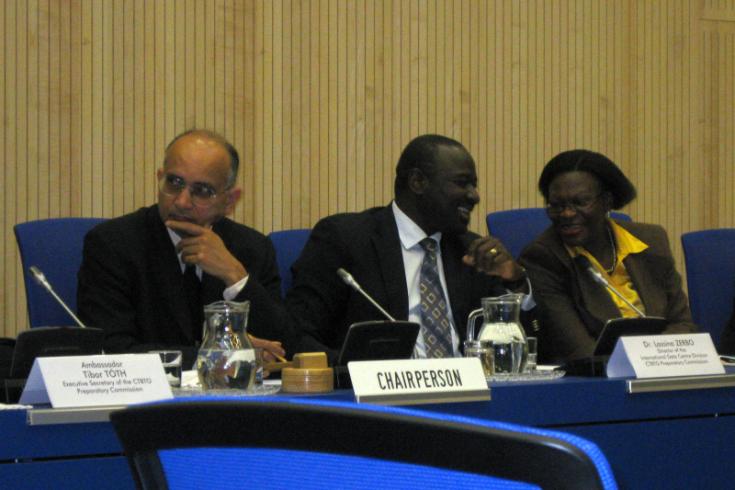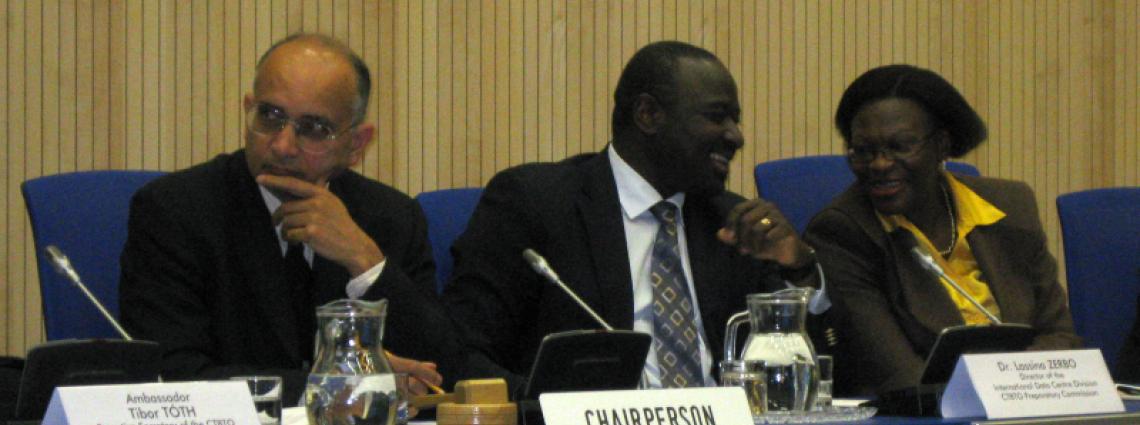Creating the "Buy-In" to Strengthen Arms Control and Disarmament
To cope with mounting nuclear challenges, the next generation of diplomats and policymakers needs to better understand the scientific and political complexities, the annual meeting of the Academic Council of the United Nations was told 4 June 2010, at the Vienna International Centre.
“Multilateral arms control regimes and verification mechanisms are getting increasingly complex…To be able to make informed decisions, we need many more knowledgeable diplomats and policy makers; and we need many more verification experts who understand the political complexities,” Tibor Tóth, the Executive Secretary of the Preparatory Commission for the Comprehensive Nuclear- Test-Ban Treaty (CTBTO), informed a workshop session on Capacity Building and Training: The Role of International Organizations.
Similar views were expressed by Ambassador Selma Ashipala-Musavyi, a seasoned diplomat and Namibia’s Permanent Representative to the United Nations in Vienna. She has spent the last two decades serving her country but describes her own experience as a young diplomat as “a massive learning curve”, for which she was initially equipped with only a “theoretical and ad hoc” understanding of nuclear issues.
Today Ashipala-Musavyi is the Chairperson of the CTBTO but she says that many young diplomats still experience the same difficulties. “Students in developing countries do not always get exposure to disarmament and nuclear non-proliferation issues -- and often know very little about it,” she said.
The CTBT verification regime relies more on science and technology than any other international arms control treaty. This makes full participation particularly challenging for developing countries, she said.
“Multilateral arms control regimes and verification mechanisms are getting increasingly complex…To be able to make informed decisions, we need many more knowledgeable diplomats and policy makers; and we need many more verification experts who understand the political complexities,” Tibor Tóth, the Executive Secretary of the Preparatory Commission for the Comprehensive Nuclear- Test-Ban Treaty (CTBTO), informed a workshop session on Capacity Building and Training: The Role of International Organizations.
Similar views were expressed by Ambassador Selma Ashipala-Musavyi, a seasoned diplomat and Namibia’s Permanent Representative to the United Nations in Vienna. She has spent the last two decades serving her country but describes her own experience as a young diplomat as “a massive learning curve”, for which she was initially equipped with only a “theoretical and ad hoc” understanding of nuclear issues.
Today Ashipala-Musavyi is the Chairperson of the CTBTO but she says that many young diplomats still experience the same difficulties. “Students in developing countries do not always get exposure to disarmament and nuclear non-proliferation issues -- and often know very little about it,” she said.
The CTBT verification regime relies more on science and technology than any other international arms control treaty. This makes full participation particularly challenging for developing countries, she said.

Ambassador Selma Ashipala-Musavyi says capacity building is needed to strengthen nuclear non-proliferation and disarmament.
“It is only through capacity building and training that the CTBT [Comprehensive Nuclear –Test-Ban Treaty] can be seen as a Treaty not only of obligation but benefit as well,” Ashipala-Musavyi said.
Knowledge and understanding is vital to create the “buy-in” needed to build a stronger arms control and disarmament regime, the workshop heard. “A lack of participation erodes the broad support for arms control and disarmament efforts, and increases the likelihood for politicizing issues and political ‘hostage taking’, Tóth said.
“Capacity building is essential -- the CTBTO has a number of initiatives to help address these issues,” the Executive Secretary said. The CTBTO is currently restructuring and expanding its capacity development activities to:
Knowledge and understanding is vital to create the “buy-in” needed to build a stronger arms control and disarmament regime, the workshop heard. “A lack of participation erodes the broad support for arms control and disarmament efforts, and increases the likelihood for politicizing issues and political ‘hostage taking’, Tóth said.
“Capacity building is essential -- the CTBTO has a number of initiatives to help address these issues,” the Executive Secretary said. The CTBTO is currently restructuring and expanding its capacity development activities to:
- Focus on virtual training and capacity building tools through comprehensive e-learning modules with access to Internet based lectures and tutorials.
- Establish post-graduate opportunities and post-doctoral residencies in the CTBTO.
BACKGROUND
The CTBTO’s capacity building and training initiatives include:
- Cost-free access to training materials and a variety of distance learning tools in CTBTO technical/scientific areas, including:
- Geophysics (seismology, meteorology, and acoustics)
- Nuclear sciences, computer sciences, system engineering and expertise in maintenance, and information and communication technology. - “Primer level” teaching material, available via the internet, targeted to reach as broad as possible audience. Including:
- Courses on verification technologies and sciences for diplomats, policy makers, students (political sciences, international relations etc.)
- Courses on nuclear non-proliferation and disarmament, CTBT role and history for verification experts, diplomats, policy makers, students (disarmament education)
- On-the-job training at the CTBTO in Vienna (selected scientists and engineers in particular from developing countries).
9 Jun 2010
